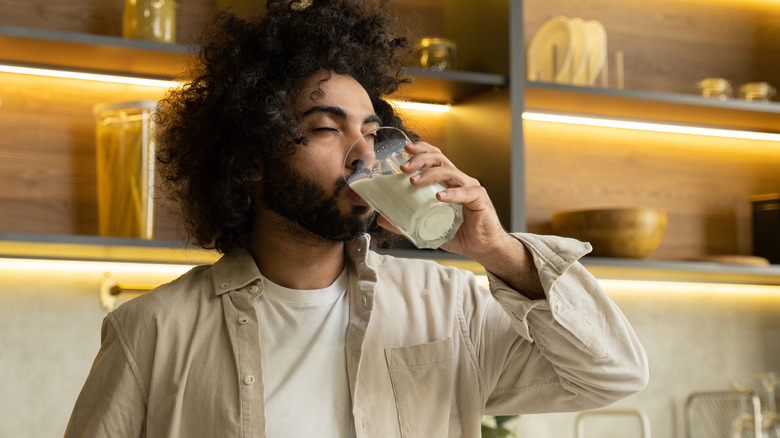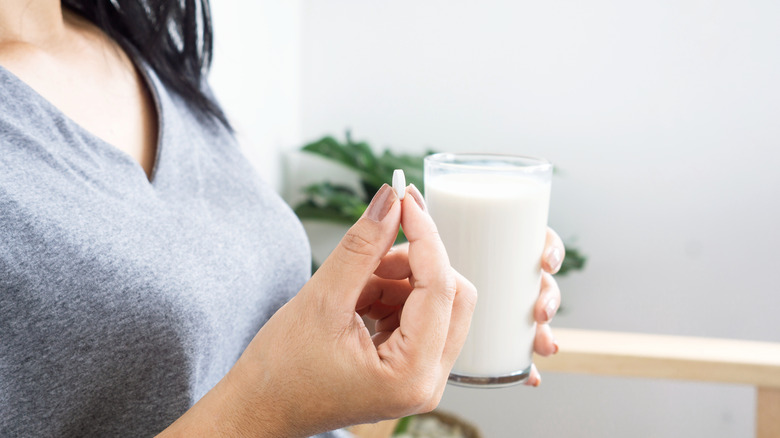The Popular Supplement You Shouldn't Take With Milk
Milk might pair well with smoothies, a bowl of cereal, or a handful of chocolate chip cookies, but it's not always safe for it to accompany our medications. While milk might seem harmless enough, it has noted interactions with certain supplements and can subsequently reduce their effectiveness, reports the American Medical Association (AMA). This is the case for one popular supplement taken by up to 18% of people in the U.S., according to the National Institutes of Health. For those taking iron supplements, you'll want to hold off on that glass of milk.
Iron can be found in a variety of dietary sources, yet many of us are failing to get enough of the essential mineral. Iron supports the health of our tissues, muscle metabolism, and the transport of oxygen through our bloodstream, so we want to make sure we're getting sufficient amounts of the mineral each day. If not, a person may join the ranks of the approximately 10 million Americans affected by iron deficiency. In some cases, your doctor may advise supplementation to boost iron levels in the body. Although it may make it easier to swallow the medication, you'll want to avoid downing a glass of milk with your iron supplement.
Milk may reduce iron absorption
"If you're taking an iron supplement or eating iron-rich foods and drinking milk at the same time, that might reduce absorption," hematologist and delegate for the American Society of Hematology Dr. Amar Kelkar told the American Medical Association (AMA). This relationship between milk consumption and reduced iron absorption was examined in a 2009 study published in Childhood Obesity and Nutrition.
The researchers pointed out that cow's milk, which contains low levels of iron, can interfere with all three steps involved in the body's processing of the mineral: consumption, absorption, and excretion. Milk's high casein content — the protein responsible for its white coloring — may be partly to blame. Also to blame may be the reduced levels of vitamin C in cow's milk that occur as a result of pasteurization. This vitamin would otherwise boost absorption. Milk also contains high amounts of phosphorus — a mineral that has also been linked with hindering iron absorption. But phosphorus isn't the only mineral that may be playing a role in milk's obstruction of iron absorption.
How long to wait to take iron after drinking milk
While great for building up our teeth and bones, the calcium in cow's milk also appears to interfere with iron absorption, Dr. Kelkar told the AMA. This was touched on in an excerpt from the 2017 book "Nutrients in Dairy and their Implications on Health and Disease," in which the opposite relationship was explored between dietary iron consumption and calcium supplementation. Research shows that calcium supplements can negatively impact both nonheme and heme iron absorption. Nonheme iron can be found in plants, while heme iron and nonheme iron can be found in meat, poultry, and seafood, explains the National Institutes of Health.
Whether we get our iron from the foods we eat or from supplements, we'd best not pair it with milk. This doesn't mean the beverage needs to be completely eliminated from our diet, however. Those taking iron supplements will instead need to stagger the time between drinking cow's milk and taking their supplements. Specifically, MedlinePlus states that patients will want to hold off on taking iron supplements for two hours or more after enjoying a glass of milk.



